We began our ministry in Uganda in 1980 with the Child Sponsorship Program. In 1999, we started the Leadership Development Program, and the Child Survival Program followed in 2006.
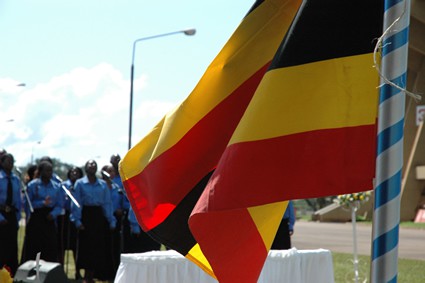
We are privileged to have had many new programs and innovations begin in Uganda. For example, the second Alumni Association was started here and the Child Survival Program was piloted here. In addition, we celebrated the 1000th Leadership Development Program graduate in 2009.
Country Director
Our country director in Uganda is Herbert Turyatunga. Herbert started with the ministry as a program facilitator in 1999. He became country director in 2010. Prior to joining us, he worked as a salesman in a soft drink bottling company.
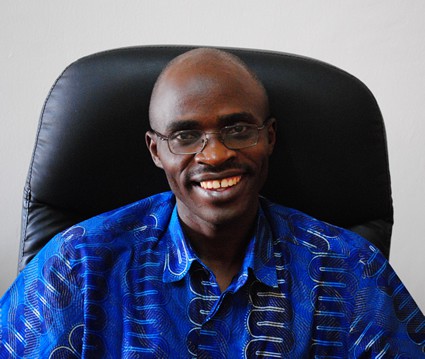
Herbert has a passion to equip young leaders. His dream is to start a leadership resource center to equip young men and women in Africa to solve the leadership problem in the continent. He believes that once the leadership problem has been addressed, poverty will be resolved as well.
Herbert holds a bachelor’s degree in social sciences from Makerere University in Kampala, a master’s degree in child development from Daystar University in Nairobi, and a higher diploma in marketing from Makerere University Business School.
Implementing Church Partners
Implementing Church Partners are local churches in Uganda with whom we work to deliver child development programs and frontline ministry in the field.
- Spiritual Climate
The Islamic religion is growing as are Islamic cults. They are focusing on children and even beginning to do sponsorship programs, which are training children in Islamic beliefs and holding program activities on Saturdays. Despite this, evangelical Christians are also growing in number. - Unique Challenges
We face the following challenges in Uganda:- Rising rates of child abuse
- Rising costs of education
- Lack of role models in the children’s communities
- School systems that require children to attend school six days a week
- Absentee parents/caregivers
- Lack of sufficiently trained Implementing Church Partner staff for curriculum implementation
- Contributions
Implementing Church Partners provide the land, construction and buildings where the programs take place.They also provide monetary contributions, labor, knowledge and experience, and their solid reputation in the community.
- Partner Development Activities
We develop partners through training based on their specific needs.
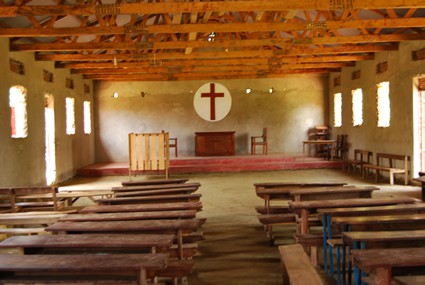
Child Survival Program
- Caregiver Literacy
Implementing Church Partner staff assess the literacy level of the mothers, and they are grouped into various levels and classes based on that assessment. The Implementing Church Partner networks with Functional Adult Literacy volunteer instructors who are locally trained by the government to teach the mothers.We utilize the Functional Adult Literacy curriculum which covers topics such as basic hygiene, income-generating skills, simple math, reading, writing, simple accounting and bookkeeping skills.
- Income-generating Skills
We offer various income-generating skills depending on the caregivers’ needs, the available market for the products and the affordability of the training.Some of the skills we offer include bead making, soap making, baking, catering, hair dressing, shop keeping, agriculture, animal rearing, mushroom growing, bee keeping, poultry farming and tailoring. The frequency of the trainings varies between Child Survival Programs.
- Health Care
Implementing Church Partner staff conducts an assessment of the quality of health services at the health centers, clinics and hospitals in the community. Based on the results of that assessment, they select one or two providers that have the best maternal and child health services and sign a contract with them to offer these services to Child Survival Program beneficiaries.Some Implementing Church Partners are able to negotiate reduced rates for health services, and some are able to negotiate payment plans or delayed payment for services. The Implementing Church Partner covers the costs of medical services and then requests reimbursement from the country office.
We pay for all medical expenses incurred by the caregivers and children in the Child Survival Program. There are a few services that are provided free of charge at the government health centers, such as immunizations, de-worming and vitamin-A supplements.
- Nutritional Support
Implementing Church Partners provide six months of nutritional supplements to malnourished children and caregivers and to those who could be vulnerable to malnutrition. After a period of six months, it is expected that the beneficiaries will improve, and most of them do.As they receive support, the Implementing Church Partners also help caregivers develop a sustainability plan, such as developing land to grow food or learning an income-generating skill so that if they continue to need nutritional supplements at the end of the six months, they will be able to afford them.
We train all caregivers on infant feeding practices, food preparation, balanced diets, fruit and vegetable gardening, modern farming methods, animal rearing and income-generating skills. The caregivers use these skills to earn money and buy nutritious food for their family.
- Involvement of Fathers
We make efforts to improve the fathers’ involvement in the Child Survival Program by organizing men’s seminars that speak to fathers about their role in early childhood development.We hold Spouse’s Day and recognize the fathers who attend group activities as well as have a celebration of fathers.
- Transitioning Out of the Child Survival Program
We hold transitional classes for caregivers and children preparing to transition out of the Child Survival Program and into the Child Sponsorship Program. Three months before a child turns 3, he will attend the 3- to 5-year-old Child Sponsorship Program classes.For the caregivers, we hold classes where they can develop a plan utilizing their income-generating skills as well as discuss ways to improve their livelihood and their role in caring for their children.
- Areas of Expansion for the Child Survival Program
We plan to expand the Child Sponsorship Program in the regions that have low maternal and child survival indicators according to the Uganda Health Demographic Survey of 2006, and into areas that do not have Child Sponsorship Programs, so they can have a greater impact on their communities.
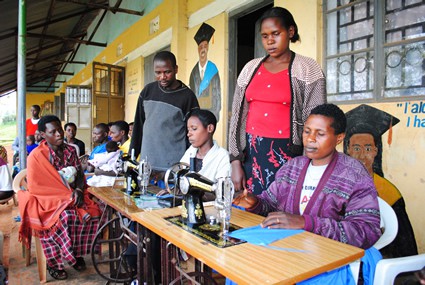
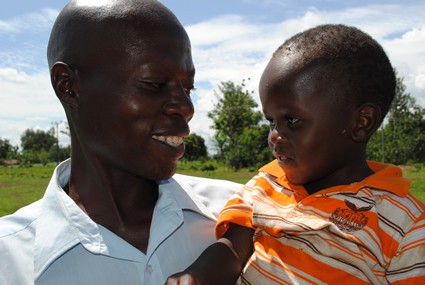
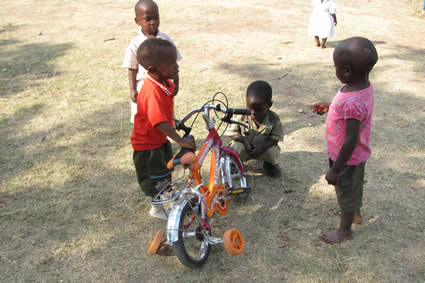
Child Development Through Sponsorship
Your sponsorship of a child in Uganda provides a variety of benefits.
Many children ages 12 and older attend boarding school and are away from home for 3 months at a time. In this case, each Implementing Church Partner has the freedom to organize a “catch-up” program that meets the needs of these children. For example, they might meet 3 days a week, 8 hours a day during their school holiday. Regardless of the schedule, each Implementing Church Partner should offer 48 weeks of program activities.
- Meeting Times:
- 3 to 5 year olds: 8 hours on Saturdays
- 6 to 8 year olds: 8 hours on Saturdays
- 9 to 11 year olds: 8 hours on Saturdays
- 12 to 14 year olds: 8 hours on Saturdays, or 3 to 5 days a week during holidays
- 15 to 18 year olds: 8 hours on Saturdays, or 3 to 5 days a week during holidays
- 19 +: 8 hours on Saturday, or 3 to 5 days a week during holidays
- Nutritional Support
Each child receives a snack as well as lunch each time he or she comes to the child development center, which is usually once a week. A snack might be something such as tea, porridge and a bun. Lunch consists of maize, rice or matooke (plantains) with beans, peas or beef.Children who have special nutritional requirements receive three to six months of nutritional therapy, meaning that their caregivers are taught how to prepare certain foods at home with ingredients provided by the child development center.
We provide regular meals for the children at the center because some do not have nutritional meals at home; in fact, some do not have meals at all. Plus, the children are at the development center for eight hours at a time, so they need to be fed.
- Vaccinations
The government holds a national immunization drive for children ages 2 to 14, and vaccines such as polio and measles are given free of charge. Children who are older than 14 and in need of vaccines can receive them at local health networks and clinics.It is the responsibility of the parents to ensure their children are receiving the proper vaccinations. The Implementing Church Partners support the government’s effort to educate parents about the importance of vaccine programs.
- Extracurricular Activities or Community Service
We have weekly extracurricular activities such as sports, drama, debate and others. The children also participate in regular service opportunities such as work camps, road cleaning, church activities and service to the elderly. - Vocational Activities
Adolescents participate in vocational training skills such as carpentry, tailoring, crocheting, sewing, knitting and mat making.We offer these skills to give the students opportunities to generate income — especially for those who do not finish high school. The skills offered to these adolescents have been relevant to the Ugandan culture for some time; however, skills such as radio and computer repair are beginning to be more marketable.
At this time, the students are learning skills only at a basic level, because there is not enough funding to offer certification.
- Alumni Activities
The alumni group has been active since 2007 and consists of both Child Sponsorship and Leadership Development Program alumni. This group is actively engaged in missions, child advocacy, and training and some support a child in the Child Sponsorship Program. - Parent Involvement
We offer monthly classes on adult literacy, quarterly trainings on topics such as hygiene, sanitation, parenting and income-generating activities.Voluntary counseling and testing and HIV training are done when a child development center is started and later on if needed.
- Areas of Expansion for the Child Sponsorship Program
We would like to expand into the eastern and northern areas of Uganda. These are the areas with the greatest need and the highest poverty indicators. The war that occurred in northern Uganda also created a great need.
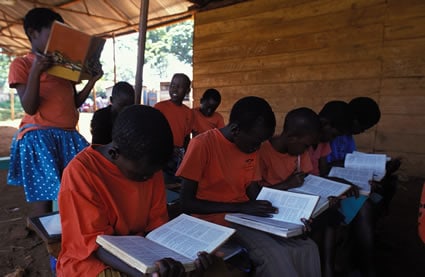
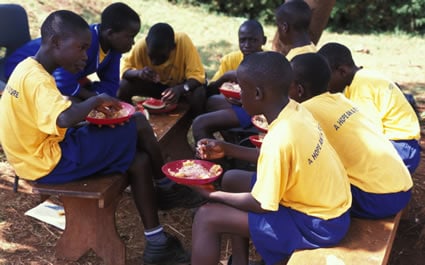
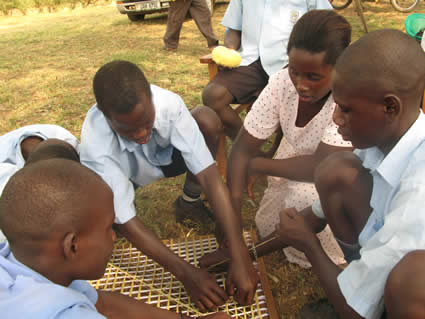
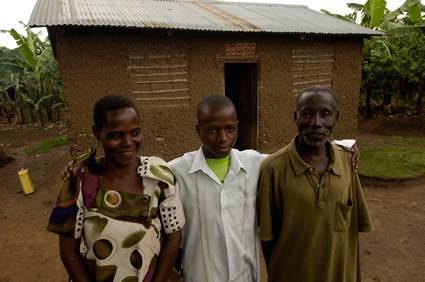
Leadership Development Program
- Universities Attended
Leadership Development Program students attend government, private, secular and Christian universities. - Location of Universities
Universities are spread throughout the country, but most are located in urban or semi-urban areas. - Service Opportunities
Service opportunities for Leadership Development Program students typically involve community service in both rural and urban areas, as well as at their former Child Development Center and their universities.Some examples of service activities include cleaning the residence halls or washing dishes at their universities, teaching Sunday school at their child development center, and holding work camps where they build churches in their communities.
- Leadership Development Program Meetings
The larger Leadership Development Program group usually meets three times a year to cover curriculum topics. In addition, the students hear guest speakers, share experiences and testimonies and participate in sports activities together. - Specialty Curriculum Topics or Resources
We use the “Choose to Wait” curriculum that teaches abstinence as a lifestyle. We also utilize experts who have professional experience in certain modules of the Leadership Development Program curriculum. These experts partner with us to teach and engage with the students. - Mentors
We encourage the students to find mentors on their own, but recently we have been more intentional about helping them. We do this by holding mentors’ events where we share about the Leadership Development Program and challenge the participants to mentor the students both professionally and spiritually. - Leadership Development Program Alumni Group
The alumni group has been active since 2007 and consists of both Child Sponsorship and Leadership Development Program alumni.
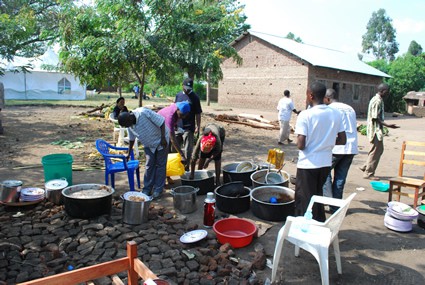
Complementary Interventions
Compassion’s core Child Sponsorship Program, while comprehensive, cannot address all obstacles to a child’s healthy development. Compassion’s Complementary Interventions program works in harmony with the holistic child development model to provide additional services as needed, such as the AIDS Initiative, Bibles for All Children, disaster relief and water projects.
Typical Complementary Interventions in Uganda include:
- Malaria Prevention
Beneficiaries are trained in malaria prevention, such as keeping their home environments clean, clearing the brush around their home and clearing stagnant water.They are also given insecticide-treated mosquito nets.
- HIV Intervention
Beneficiaries access voluntary counseling and testing services, as well as receive antiretroviral medications. Some siblings of registered children are also supported. - Water and Sanitation
Water sources have been constructed, and child development centers have utilized software and sanitation tool kits. Children who live near an Implementing Church Partner benefit by having clean water for drinking, cooking, washing and income-generating activities such as mushroom growing.Additionally, several child development centers received support for ventilated improved pit latrines.
- Nutrition
A food security program provides seeds for caregivers. In turn, they are able to harvest food and improve the nutritional status of those in their household.The plan is for caregivers to get improved seeds and share the seeds with others after the harvest.
- Formal Education
School fees are paid for children in secondary school, pre-university and post-secondary education. This is necessary because secondary education is not free in Uganda, and sponsorship funds are not sufficient to pay for school fees. - Oral Health
Beneficiaries receive dental screening and treatment. - Infrastructure Development
Child development centers in rural areas without electricity have been able to access power, either hydroelectric or solar. Child development centers located near roads have set up chain link fences to ensure the safety of the children. Also, beneficiaries’ homes have been reconstructed when needed. - Non-formal Education
Children receive fees for vocational training. Implementing Church Partners receive support toward resource centers, environmental education, youth camps and vocational training. - Income-generating Activities
Beneficiaries receive support for income-generating projects such as goat rearing, which has proved to be a viable project.
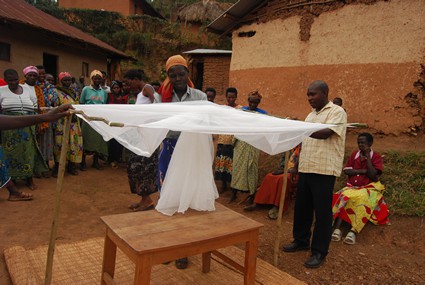
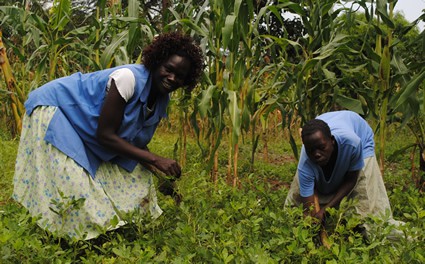
Highly Vulnerable Children
Our primary Highly Vulnerable Children need is providing a home for the children who are homeless. There are also children living in child-headed homes who are in need of appropriate shelter and in need of school fees. We are addressing these needs through foster care, income-generating activities, shelter interventions, livelihood skills development and food security.


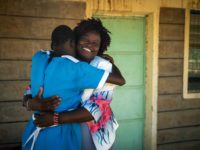
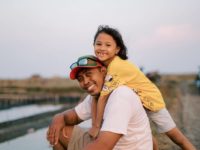
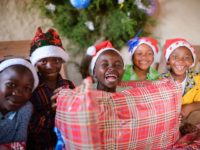


5 Comments |Add a comment
I like the literacy levels baseline assessment done before CSP mothers are enrolled and the grouping programming that follows.
Excellent.
Thanks for the work done towards my success and my country Uganda
I was one of the sponsored children in uganda.I thank compassion for the great work it has done for us.May the lord reward u all our sponsors we love u all.
Emmanuel Sebakaya is our “Ugandan” son. He is now 20 y/o and is graduating from the program. I pray that there is a way to continue to keep in touch with him. We love him and pray one day we will, in person, meet. I do not want to lose touch. We have followed him for so many years. He is our blessing from God. Our natural son died during the sponsoring of Emmanuel and some how Emmanuel filled a void in our hearts. People say we have sacrificed but they are wrong. We are the ones that have been honored to have know him.
Our sponsored “son” lives in Uganda. We have watched him grow into a strong young man…strong in spirit and in body. We are SO very thankful to be a part of his life. It has truly been a privilege to reach out in God’s love and we thank those who are there helping to teach, provide and love on the children. You bless us! We love our “son”…and hope to meet him someday.